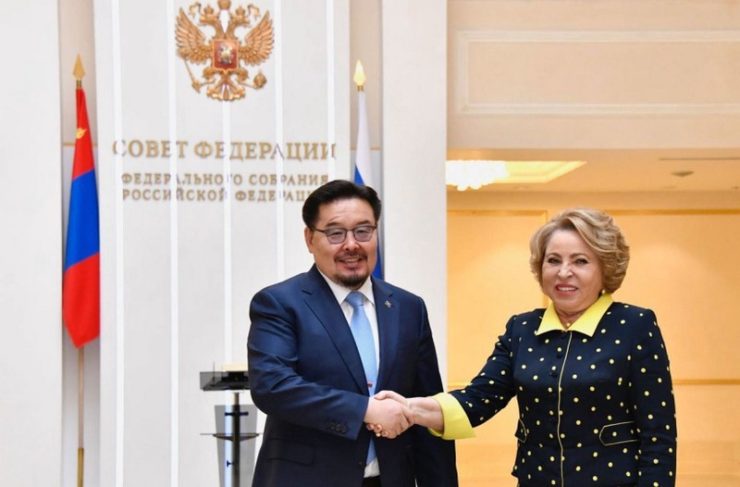
On June 22, the visit of the Speaker of the Parliament (State Great Khural) of Mongolia to the Russian Federation ended.
It is important to note that this is the first top-level Mongolian visit to Russia since the start of the Special Military Operation; the country’s president last visited Russia on an official visit in December 2021, the foreign minister in the summer of the same year, and Parliament Speaker Gombojavyn Zandanshatar himself in 2019. Even though there was no meeting between the speaker of the parliament and the Russian president and foreign minister, the visit can be considered one of the most significant events in Russian-Mongolian ties in the last year.
Gombojav Zandanshatar is a member of the Mongolian political elite who has personal memories of Russia; he was educated at Baikal State University and became an honorary professor there in 2012. He is fluent in Russian.
The Speaker of the Mongolian Parliament met with his Russian counterparts, the spokespersons of the Federation Council and the State Duma of the Federal Assembly, during his official visit to the Russian Federation. On his trip from Moscow to Ulaanbaatar, Gombojav Zandanshatar addressed issues of inter-regional cooperation between the two countries and met with the Irkutsk region’s leadership.
The ceremonial part of the visit included laying of flowers by Gombojav Zandanshatar at the tomb of the Unknown Soldier in Alexandrovsky Garden as well as at the monument “On the Roads of War” on Poklonnaya Hill. Special attention was paid to the symbolism of the date of June 22—the day of memory and mourning—which went down in history as the day of the attack of Nazi Germany on the Soviet Union. As part of the 1936 defensive pact between the USSR and the Mongolian People’s Republic, it should be remembered that the Mongolian side declared war on Germany as early as June 23, 1941, and significantly assisted the Soviet Union in its struggle against Japanese militarism and German Nazism.
During the meetings with Vyacheslav Volodin and Valentina Matvienko, Zandanshatar signed an agreement on the formation of an inter-parliamentary group and scheduled its first meeting to be held in Ulaanbaatar. The two sides expressed their desire to develop a partnership of lawmakers of the two countries.
Despite the dominating “inter-parliamentary” rhetoric and visit concept, Gombojav Zandanshatar highlighted the most significant bilateral concerns for Mongolia to his Russian counterparts. He spoke of the need to intensify bilateral infrastructure projects, whose implementation, in his opinion, is proceeding “at a slow pace”. In addition, the Speaker of the Mongolian Parliament mentioned the issue of establishment of a free economic zone between Russia and Mongolia, as well as the elimination of trade imbalances between the two countries; in particular, Gombojav Zandanshatar discussed the prospects of increasing the supply of Mongolian wool and leather products to the Russian market.
During the visit, attention was also paid to the issue of Rosneft’s fuel supplies to Mongolia. During the meeting with Igor Sechin, the parties agreed on compensation measures in case of delays in fuel supplies to Mongolia due to the congestion of the Ulaanbaatar railroad, as well as to increase the export volumes of petroleum products in the country.
The main characteristics and results of the visit show that Mongolia’s “sending” of the speaker of parliament to Russia had a much broader range of goals and objectives than it might have seemed from the headlines. The visit’s agenda is more like that of foreign ministers or heads of state. This unusual nature of Zandanshatar’s visit to Moscow may be due to a combination of two circumstances: the pressure on the top leadership of Mongolia by its Western partners, which limits the breadth of the choice of formats of communication with Russia, and the continuing importance of the Russian direction in Mongolian foreign policy.
Zandanshatar’s visit had far less publicity in the Mongolian media and official portals of government agencies than the recent visits of Macron and Duda to Mongolia, as well as this year’s visits of Gombojav Zandanshatar to Japan and Prime Minister of Mongolia Luvsannamsrain Oyun-Erdene to South Korea. The chronicle was not displayed in separate “columns” or placed on the “home page” of information resources. The visit of the speaker of the parliament to Russia was discussed in Mongolian political circles for a long time, although the fact that it would still take place was announced in the media almost on the day of his arrival. All this, coupled with a long break in visits to Russia by Mongolian politicians of such a high level can only mean that this (or similar) trip was very unwanted in the “West.” It is likely that the Mongolian side received some “hints” about the undesirability of a high-level visit to Russia, which forced Mongolia to make a number of restrictions. Nevertheless, the importance of relations with the “Northern Neighbor” does not allow Mongolia to show excessive loyalty to its “third neighbors.”
Boris Kushkhov, the Department for Korea and Mongolia at the Institute of Oriental Studies of the Russian Academy of Sciences, exclusively for the online magazine “New Eastern Outlook.”
